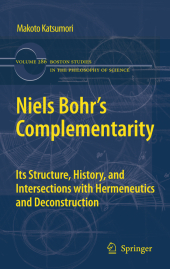 Neuerscheinungen 2013Stand: 2020-01-07 |
Schnellsuche
ISBN/Stichwort/Autor
|
Herderstraße 10
10625 Berlin
Tel.: 030 315 714 16
Fax 030 315 714 14
info@buchspektrum.de |

Makoto Katsumori
Niels Bohr´s Complementarity
Its Structure, History, and Intersections with Hermeneutics and Deconstruction
2011. 2013. xiv, 178 S. 6 Tabellen. 235 mm
Verlag/Jahr: SPRINGER NETHERLANDS; SPRINGER 2013
ISBN: 9400737335 (9400737335)
Neue ISBN: 978-9400737334 (9789400737334)
Preis und Lieferzeit: Bitte klicken
Through detailed textual and conceptual analysis, and with special attention to the potentially conflicting elements of Bohr´s thought, this volume´s fresh approach analyzes the relations between realism and antirealism through the prism of complementarity.
This book explores the modern physicist Niels Bohr´s philosophical thought, specifically his pivotal idea of complementarity, with a focus on the relation between the roles of what he metaphorically calls "spectators" and "actors." It seeks to spell out the structural and historical complexity of the idea of complementarity in terms of different modes of the ´spectator-actor´ relation, showing, in particular, that the reorganization of Bohr´s thought starting from his 1935 debate with Einstein and his collaborators is characterized by an extension of the dynamic conception of complementarity from non-physical contexts to the very field of quantum theory. Further, linked with this analysis, the book situates Bohr´s complementarity in contemporary philosophical context by examining its intersections with post-Heideggerian hermeneutics as well as Derridean deconstruction. Specifically, it points to both the close affinities and the differences between Bohr´s idea of the ´actor-spectator´ relation and the hermeneutic notion of the relation between "belonging" and "distanciation."
Bohr and the Development of Quantum Theory: A Brief Review.- An Overview of Bohr´s Complementarity.- Prior Interpretations of Complementarity .- A Philosophical-Historical Analysis of Complementarity.- Intersections with Hermeneutic Philosophy.- Intersections with Derridean Deconstruction.- Concluding Remarks .- References.


